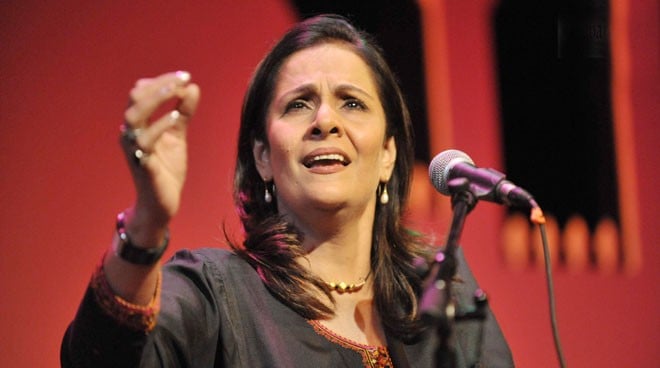

Sunday last, before the clocks hit 8:30 in the night, a queue started forming outside Alhamra Hall 1. The number of people was small compared to the capacity the hall boasts -- 50 to 60 at most. The doors opened at 9 and with the expected amount of pushing, shoving and calls for maintaining order, the people filtered into the gallery, expecting a great musical evening by Tina Sani, a renowned Karachi-based singer.
Once inside the hall, it became difficult to find a seat. The small number of people suddenly multiplied and more were pouring in from all sides. By the time we found a seat and settled down, the hall with a capacity of 750 was full to the brim and people were making themselves comfortable on the stairs.
The event was part of the three-day International Conference, titled Beetey Hoay Din Yaad Aatey Hain, hosted by the Lahore Arts Council. All events were free, including the musical evening with Tina Sani, and provided a rare opportunity to the general public.
The more privileged might still have some opportunity to attend and organise such an evening at small private venues but they are no longer within the reach of the common public. It was this aspect that made the event even more interesting and entertaining -- the versatile mix of people attending it.
After another half an hour, a stream of people entered from the side doors, placing themselves on the reserves seats. It was then that the elegant Tina Sani strode up on stage, apologising for the delay.
Accompanying her on the instruments was a host of musicians -- Abid Ali and Hassan Badshah on the flute, Iqbal Hussain on the first harmonium, Wazir Hussain on the second harmonium, Javaid Iqbal on the violin, with Kishwar Hussain on the violin and Aslam Muhammad on the tabla.
Interestingly, it was in the same hall, some 30 years ago, that Tina Sani had begun her career with a rendition of Faiz Ahmad Faiz’s poem, ‘Mere dil mere musafir.’ She recalled how the poem had earned her recognition as Shoaib Hashmi enquired about her.
"Since that day I have not left Faiz sahab’s daaman," Sani said, in her raspy voice.
On this nostalgic note, she started the programme, singing the same nazm. Singing a couplet from the poem for nostalgia’s sake, she moved on to other more popular poems by Faiz.
The next ghazal was ‘Nahi nigah mein koi manzil toh justaju hi sahi’. As she explained to the audience that to understand Faiz, it was the next few verses of the poem one needed to understand. "These next few verses are very special," she said. "They’d help you recognise Faiz sahab’s personality."
The couplet ran as such -- ‘Dayar e ghair mein agar mehram nahi koi, toh faiz zikar e watan aone ruhbaru hi sahi.’
Devoting a large part of the evening to Faiz, Sani moved on to sing Amir Khusro and Rumi. While she can also sing in Persian, she made a conscious choice to sing Rumi in Urdu. "This is because I though it was important for the Pakistani audience to understand Jalaluddin Rumi," she told the audience.
Singing Younas Sethi’s translation, the composition used the same tunes that are popular in the area, making good use of the flute.
The poem, titled ‘Nawai ney’, talked about the story told by the reed flute, in its opening verse. Sani used this as an excuse to explain to the audience the importance of the entire musician troupe.
Ironically, earlier, the people had complained that the flute was too loud. The poem and the composition chosen perfectly highlighted the bansuri which remained the predominant instrument within the musical composition.
Ending the programme with her most celebrated ‘Shikwa’ and ‘Jawab-e-shikwa’, Sani once again called Adeel Hashmi on stage. Earlier, he had recited a few couplets from Faiz’s sheeshon ka masiha, while Sani crooned the verses in her melodious voice. This time Hashmi took up ‘Jawab-e-shikwa’, while Sani in her all-powerful voice sang ‘Shikwa’ leaving no space for Hashmi’s delivery.
A performer to the core, Tina Sani proved to her audience that classical music is not necessarily an activity of the old and the boring. The evening felt like a dialogue with the audience, as she stopped occasionally to take suggestions.